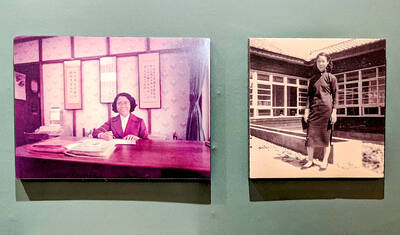As the featured country in the film festival Shooting Left Asian ’10 — Korea Now, which opened at Guling Street Avant-Garde Theatre on Wednesday, South Korea doesn’t bear the slightest resemblance to a sparkling nation of pretty-faced pop stars and electronic gadgets that most of us are familiar with.
On the contrary, forced eviction, women’s labor protests and a homosexual political movement are among the sociopolitical issues tackled in the seven documentary films screened at this festival. Initiated in 2006 with a series of film screenings, forums and panel discussions, the Shooting Left Asian event is organized by Bodyphase Studio (身體氣象館) on an irregular basis with the aim of exploring Asian countries from a social activist perspective.
The struggles of ghetto tenants in central Seoul come into focus in People Who Can Not Leave and Yongsan, Expression in 337 Way: Rhea, both of which deal with last year’s violent crackdown against participants in a sit-in protest against forced evictions in the Yongsan neighborhood that left six people dead. Many of the clips were shot by activists present at the event, for whom being able to produce and spread their message quickly and widely is much more important than high production values. These clips nevertheless have a strong sense of immediacy.
Extended interviews and a focus on the everyday lives of locals help build a deeper understanding of the issues surrounding the government’s redevelopment projects, which many believe sacrifice the landless poor for the profits of the conglomerates.
The Border City 2 is a polished production that explores the deep divisions between the two Koreas, a living heritage of the Cold War, through the personal turmoil of Song Du-yul, a renowned South Korean philosophy professor who lived in Berlin for more than 35 years. Branded a North Korean spy, Song returned to his homeland in 2003 and immediately faced a five-year trial that ignited fierce conflicts within South Korean society.
Another highlight is Earth’s Women, an affecting documentary by female director Kwon Woo-jung that has gained wide exposure on the film festival circuit. The film follows the lives of three women who moved to farming communities and devoted themselves to the peasants’ movement after graduating from college.
“These documentaries are very direct and powerful. You can tell the filmmakers are keen to make observations and are very articulate in formulating issues. Watching these works makes us realize that we in fact hardly know anything about South Korea,” said Yao Li-qun (姚立群), director of Bodyphase Studio.
Additional screenings of films such as People Who Can Not Leave and Yongsan, Expression in 337 Way: Rhea will take place at the Sanying Aboriginal Community (三鶯部落) and Losheng Sanatorium (樂生療養院), two Taipei-area communities facing relocation. Discussions will also be held by activists and academics from South Korea and Taiwan on related social and political issues. For more information, call (02) 2391-9393.

Following the shock complete failure of all the recall votes against Chinese Nationalist Party (KMT) lawmakers on July 26, pan-blue supporters and the Chinese Communist Party (CCP) were giddy with victory. A notable exception was KMT Chairman Eric Chu (朱立倫), who knew better. At a press conference on July 29, he bowed deeply in gratitude to the voters and said the recalls were “not about which party won or lost, but were a great victory for the Taiwanese voters.” The entire recall process was a disaster for both the KMT and the Democratic Progressive Party (DPP). The only bright spot for

Aug. 11 to Aug. 17 Those who never heard of architect Hsiu Tse-lan (修澤蘭) must have seen her work — on the reverse of the NT$100 bill is the Yangmingshan Zhongshan Hall (陽明山中山樓). Then-president Chiang Kai-shek (蔣介石) reportedly hand-picked her for the job and gave her just 13 months to complete it in time for the centennial of Republic of China founder Sun Yat-sen’s birth on Nov. 12, 1966. Another landmark project is Garden City (花園新城) in New Taipei City’s Sindian District (新店) — Taiwan’s first mountainside planned community, which Hsiu initiated in 1968. She was involved in every stage, from selecting

As last month dawned, the Democratic Progressive Party (DPP) was in a good position. The recall campaigns had strong momentum, polling showed many Chinese Nationalist Party (KMT) lawmakers at risk of recall and even the KMT was bracing for losing seats while facing a tsunami of voter fraud investigations. Polling pointed to some of the recalls being a lock for victory. Though in most districts the majority was against recalling their lawmaker, among voters “definitely” planning to vote, there were double-digit margins in favor of recall in at least five districts, with three districts near or above 20 percent in

The great number of islands that make up the Penghu archipelago make it a fascinating place to come back and explore again and again. On your next trip to Penghu, why not get off the beaten path and explore a lesser-traveled outlying island? Jibei Island (吉貝嶼) in Baisha Township (白沙鄉) is a popular destination for its long white sand beach and water activities. However, three other permanently inhabited islands in the township put a unique spin on the traditional Penghu charm, making them great destinations for the curious tourist: Yuanbeiyu (員貝嶼), Niaoyu (鳥嶼) and Dacangyu (大倉嶼). YUANBEIYU Citou Wharf (岐頭碼頭) connects the mainland